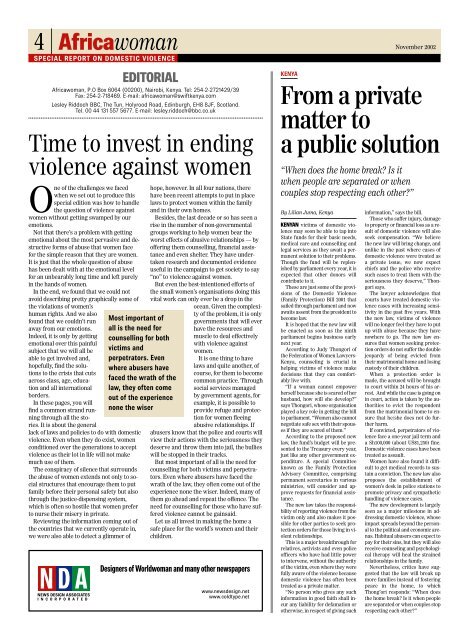Issue 7 - Domestic Violence - ColdType
Issue 7 - Domestic Violence - ColdType
Issue 7 - Domestic Violence - ColdType
Create successful ePaper yourself
Turn your PDF publications into a flip-book with our unique Google optimized e-Paper software.
4 Africawoman November<br />
SPECIAL REPORT ON DOMESTIC VIOLENCE<br />
EDITORIAL<br />
Africawoman, P.O Box 6064 (00200), Nairobi, Kenya. Tel: 254-2-2721429/39<br />
Fax: 254-2-718469. E-mail: africawoman@swiftkenya.com<br />
Lesley Riddoch BBC, The Tun, Holyrood Road, Edinburgh, EH8 8JF, Scotland.<br />
Tel. 00 44 131 557 5677. E-mail: lesley.riddoch@bbc.co.uk<br />
Time to invest in ending<br />
violence against women<br />
One of the challenges we faced<br />
when we set out to produce this<br />
special edition was how to handle<br />
the question of violence against<br />
women without getting swamped by our<br />
emotions.<br />
Not that there’s a problem with getting<br />
emotional about the most pervasive and destructive<br />
forms of abuse that women face<br />
for the simple reason that they are women.<br />
It is just that the whole question of abuse<br />
has been dealt with at the emotional level<br />
for an unbearably long time and left purely<br />
in the hands of women.<br />
In the end, we found that we could not<br />
avoid describing pretty graphically some of<br />
the violations of women’s<br />
human rights. And we also<br />
found that we couldn’t run<br />
away from our emotions.<br />
Indeed, it is only by getting<br />
emotional over this painful<br />
subject that we will all be<br />
able to get involved and,<br />
hopefully, find the solutions<br />
to the crisis that cuts<br />
across class, age, education<br />
and all international<br />
borders.<br />
In these pages, you will<br />
find a common strand running<br />
through all the stories.<br />
It is about the general<br />
lack of laws and policies to do with domestic<br />
violence. Even when they do exist, women<br />
conditioned over the generations to accept<br />
violence as their lot in life will not make<br />
much use of them.<br />
The conspiracy of silence that surrounds<br />
the abuse of women extends not only to social<br />
structures that encourage them to put<br />
family before their personal safety but also<br />
through the justice-dispensing system,<br />
which is often so hostile that women prefer<br />
to nurse their misery in private.<br />
Reviewing the information coming out of<br />
the countries that we currently operate in,<br />
we were also able to detect a glimmer of<br />
N D A<br />
NEWS DESIGN ASSOCIATES<br />
INCORPORATED<br />
Most important of<br />
all is the need for<br />
counselling for both<br />
victims and<br />
perpetrators. Even<br />
where abusers have<br />
faced the wrath of the<br />
law, they often come<br />
out of the experience<br />
none the wiser<br />
hope, however. In all four nations, there<br />
have been recent attempts to put in place<br />
laws to protect women within the family<br />
and in their own homes.<br />
Besides, the last decade or so has seen a<br />
rise in the number of non-governmental<br />
groups working to help women bear the<br />
worst effects of abusive relationships — by<br />
offering them counselling, financial assistance<br />
and even shelter. They have undertaken<br />
research and documented evidence<br />
useful in the campaign to get society to say<br />
“no” to violence against women.<br />
But even the best-intentioned efforts of<br />
the small women’s organisations doing this<br />
vital work can only ever be a drop in the<br />
ocean. Given the complexi-<br />
ty of the problem, it is only<br />
governments that will ever<br />
have the resources and<br />
muscle to deal effectively<br />
with violence against<br />
women.<br />
It is one thing to have<br />
laws and quite another, of<br />
course, for them to become<br />
common practice. Through<br />
social services managed<br />
by government agents, for<br />
example, it is possible to<br />
provide refuge and protection<br />
for women fleeing<br />
abusive relationships. If<br />
abusers know that the police and courts will<br />
view their actions with the seriousness they<br />
deserve and throw them into jail, the bullies<br />
will be stopped in their tracks.<br />
But most important of all is the need for<br />
counselling for both victims and perpetrators.<br />
Even where abusers have faced the<br />
wrath of the law, they often come out of the<br />
experience none the wiser. Indeed, many of<br />
them go ahead and repeat the offence. The<br />
need for counselling for those who have suffered<br />
violence cannot be gainsaid.<br />
Let us all invest in making the home a<br />
safe place for the world’s women and their<br />
children.<br />
Designers of Worldwoman and many other newspapers<br />
www.newsdesign.net<br />
www.coldtype.net<br />
KENYA<br />
2002<br />
From a private<br />
matter to<br />
a public solution<br />
“When does the home break? Is it<br />
when people are separated or when<br />
couples stop respecting each other?”<br />
By Lilian Juma, Kenya<br />
KENYAN victims of domestic violence<br />
may soon be able to tap into<br />
State funds for their basic needs,<br />
medical care and counselling and<br />
legal services as they await a permanent<br />
solution to their problems.<br />
Though the fund will be replenished<br />
by parliament every year, it is<br />
expected that other donors will<br />
contribute to it.<br />
These are just some of the provisions<br />
of the <strong>Domestic</strong> <strong>Violence</strong><br />
(Family Protection) Bill 2001 that<br />
sailed through parliament and now<br />
awaits assent from the president to<br />
become law.<br />
It is hoped that the new law will<br />
be enacted as soon as the ninth<br />
parliament begins business early<br />
next year.<br />
According to Judy Thongori of<br />
the Federation of Women Lawyers-<br />
Kenya, counseling is crucial in<br />
helping victims of violence make<br />
decisions that they can comfortably<br />
live with.<br />
“If a woman cannot empower<br />
herself because she is scared of her<br />
husband, how will she develop?”<br />
says Thongori, whose organisation<br />
played a key role in getting the bill<br />
to parliament. “Women also cannot<br />
negotiate safe sex with their spouses<br />
if they are scared of them.”<br />
According to the proposed new<br />
law, the fund’s budget will be presented<br />
to the Treasury every year,<br />
just like any other government expenditure.<br />
A special Committee<br />
known as the Family Protection<br />
Advisory Committee, comprising<br />
permanent secretaries in various<br />
ministries, will consider and approve<br />
requests for financial assistance.<br />
The new law takes the responsibility<br />
of reporting violence from the<br />
victim only and also makes it possible<br />
for other parties to seek protection<br />
orders for those living in violent<br />
relationships.<br />
This is a major breakthrough for<br />
relatives, activists and even police<br />
officers who have had little power<br />
to intervene, without the authority<br />
of the victim, even where they were<br />
fully aware of the violence because<br />
domestic violence has often been<br />
treated as a private matter.<br />
“No person who gives any such<br />
information in good faith shall incur<br />
any liability for defamation or<br />
otherwise, in respect of giving such<br />
information,” says the bill.<br />
Those who suffer injury, damage<br />
to property or financial loss as a result<br />
of domestic violence will also<br />
seek compensation. “We believe<br />
the new law will bring change, and<br />
unlike in the past where cases of<br />
domestic violence were treated as<br />
a private issue, we now expect<br />
chiefs and the police who receive<br />
such cases to treat them with the<br />
seriousness they deserve,” Thongori<br />
says.<br />
The lawyer acknowledges that<br />
courts have treated domestic violence<br />
cases with increasing sensitivity<br />
in the past five years. With<br />
the new law, victims of violence<br />
will no longer feel they have to put<br />
up with abuse because they have<br />
nowhere to go. The new law ensures<br />
that women seeking protection<br />
orders do not suffer the double<br />
jeopardy of being evicted from<br />
their matrimonial home and losing<br />
custody of their children.<br />
When a protection order is<br />
made, the accused will be brought<br />
to court within 24 hours of his arrest.<br />
And while the case is going on<br />
in court, action is taken by the authorities<br />
to evict the respondent<br />
from the matrimonial home to ensure<br />
that he/she does not do further<br />
harm.<br />
If convicted, perpetrators of violence<br />
face a one-year jail term and<br />
a Sh100,000 (about US$1,250) fine.<br />
<strong>Domestic</strong> violence cases have been<br />
treated as assault.<br />
Women have also found it difficult<br />
to get medical records to sustain<br />
a conviction. The new law also<br />
proposes the establishment of<br />
women’s desk in police stations to<br />
promote privacy and sympathetic<br />
handling of violence cases.<br />
The new development is largely<br />
seen as a major milestone in addressing<br />
domestic violence, whose<br />
impact spreads beyond the personal<br />
to the political and economic arenas.<br />
Habitual abusers can expect to<br />
pay for their sins, but they will also<br />
receive counseling and psychological<br />
therapy will heal the strained<br />
relationships in the family.<br />
Nevertheless, critics have suggested<br />
that the law will break up<br />
more families instead of fostering<br />
peace in the home, to which<br />
Thong’ori responds: “When does<br />
the home break? Is it when people<br />
are separated or when couples stop<br />
respecting each other?”
















